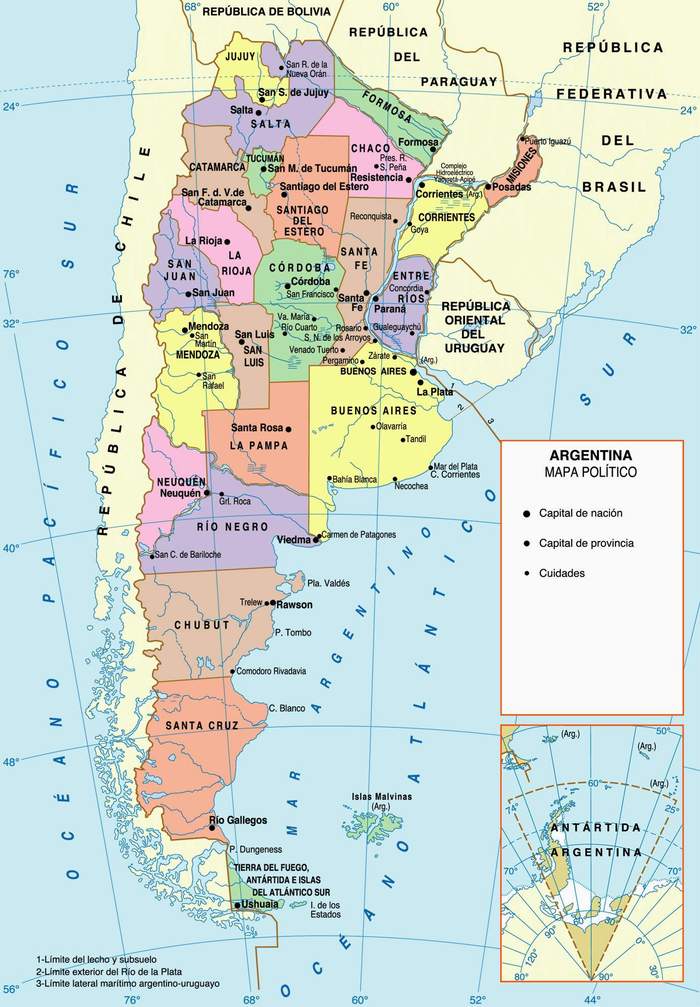Argentina in BRIEF
✔ CAPITAL: Buenos Aires
✔ AREA: 3,761,274 sq.km (1,452,228 sq.mi) of which about three-quarters is located on the South American continent, the rest consists of a section of Antarctica and three groups of islands in the South Atlantic.
✔ CURRENCY: The unit of currency is the peso ($)
✔ NATIONAL DAY: 25th of May - Anniversary of the 1810 Revolution which led to formal independence from Spain on the 9th of July, 1816.
✔ LANGUAGE: The official language is Spanish. English is widely spoken, while other languages such as Italian, French and German derive their popularity from the large immigrant population and cultural links with Europe.
✔ FLAG:The flag consists of three horizontal stripes, two sky blue with a white stripe with the sun in the centre. This became the country's official flag when it formalized independence from Spain in 1816. The "Sun of May" in the centre was added in 1818 to depict the sun shining through the clouds of Buenos Aires on the 25th of May 1810, when Argentina established its first independent government.
✔ THE NAME ARGENTINA: The Europeans were the first to visit Argentina. In 1516, a time when Spanish sailors were searching for precious metals, they sailed into a beautiful wide estuary which they named "Rio de la Plata" or river of silver. They called the land Argentina, after the Latin word meaning silvery.
Geography
Argentina is a vibrant and diverse country located in the southern part of South America. It is the eighth-largest country in the world by land area and the second largest in South America, after Brazil. Argentina is known for its natural beauty, cultural heritage, and passion for soccer.

The climate of Argentina is varied due to its size and geography. The northern region of the country is tropical and humid, while the southern region is cold and windy. The central region has a temperate climate with four distinct seasons. In the west, the Andes Mountains create a dry and arid climate.
Argentina has a diverse range of flora and fauna due to its varied climate and geography. The country is home to many unique species of animals, including the guanaco, puma, and Andean condor. The Iguazu Falls, located in the northeast of the country, is one of the most popular tourist attractions in Argentina and home to a variety of plant and animal life.
History
Argentina has a rich and complex history that spans centuries. The country was originally inhabited by indigenous people, including the Mapuche and Tehuelche, before the arrival of the Spanish in the 16th century. Argentina gained independence from Spain in 1816 and has since experienced periods of economic and political instability.
The politics of Argentina have been characterized by frequent changes in government and economic crises. The country has a presidential system of government with a bicameral Congress. The current president is Alberto Fernández, who was elected in 2019.
Economy
Argentina has a mixed economy with a focus on agriculture and industry. The country is one of the largest producers of soybeans in the world and is also a major exporter of beef and wine. Argentina has a highly educated population and a skilled workforce, which has helped to drive its economic growth in recent years.
The people of Argentina are known for their love of music, dance, and soccer. Tango, a popular dance originating in Buenos Aires, is a cultural icon of Argentina. The country is also home to many famous soccer players, including Diego Maradona and Lionel Messi.
Education
Education is highly valued in Argentina, and the country has a strong system of public and private schools. The University of Buenos Aires is one of the oldest and most prestigious universities in Latin America, and Argentina has a high rate of literacy.
The majority of the population in Argentina is Catholic, although there is a growing number of people who identify as non-religious. The country is known for its many beautiful churches and religious celebrations, including the Feast of Our Lady of Luján, which attracts thousands of pilgrims each year.
Sport
Sport is an important part of Argentine culture, and soccer is the most popular sport in the country. The national soccer team has won two World Cup championships and has produced some of the greatest players in history. Other popular sports in Argentina include rugby, basketball, and polo.
In conclusion, Argentina is a fascinating country with a rich history, diverse culture, and natural beauty. From the tropical forests of the north to the snowy peaks of the Andes, there is something for everyone in Argentina. Its complex politics and economy have shaped its past and present, but its people's love for music, dance, and soccer make it a truly unique place.